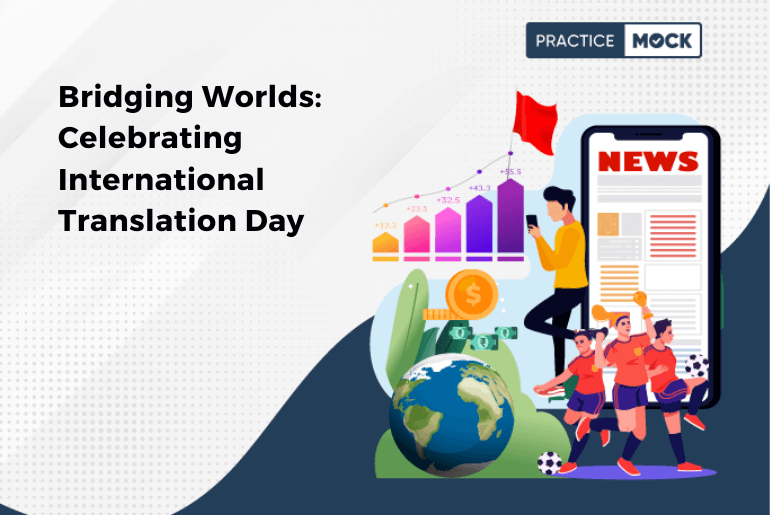n a world that’s more interconnected than ever before, the ability to communicate across linguistic and cultural boundaries is of paramount importance. Language is both a barrier and a bridge between people, and on International Translation Day, celebrated annually on September 30th, we recognize and celebrate the crucial role that translators and interpreters play in bridging these linguistic gaps and fostering understanding among diverse cultures.
The Power of Translation
Translation is more than just the conversion of words from one language to another; it’s the transfer of ideas, stories, and knowledge. It’s a tool that enables people from different corners of the world to share experiences, learn from one another, and engage in meaningful dialogue. Here are a few ways in which translation is a powerful force in our globalized society:
- Preserving Cultural Heritage: Translation allows us to preserve and appreciate the cultural heritage of different societies. It opens doors to literature, folklore, and traditions that might otherwise remain inaccessible to those who don’t speak the language.
- Advancing Global Communication: In today’s globalized world, businesses, organizations, and governments rely on translation services to communicate effectively with partners, clients, and constituents across borders.
- Enabling Diplomacy: In diplomacy and international relations, translation is essential. It ensures that agreements, treaties, and negotiations are understood accurately by all parties involved, reducing the risk of misunderstandings or conflicts.
- Promoting Education: Translation plays a vital role in education. It allows students and scholars to access research, academic materials, and educational resources from around the world.
- Supporting Humanitarian Efforts: Translators are often on the front lines of humanitarian crises, ensuring that vital information reaches affected communities. They help provide access to healthcare, education, and relief services.
The Challenges of Translation
While translation is a powerful tool, it comes with its share of challenges. Languages are complex and nuanced, and cultural differences can pose significant hurdles. Here are some of the challenges that translators and interpreters face:
- Cultural Nuances: Translating cultural idioms, humor, and context can be difficult, as these elements often don’t have direct equivalents in other languages.
- Technical and Specialized Knowledge: Some fields, such as medicine, law, and engineering, require translators to have specialized knowledge in addition to linguistic expertise.
- Language Evolution: Languages are not static; they evolve over time. Translators must keep up with these changes to provide accurate and relevant translations.
- Machine Translation: While machine translation has made great strides, it still struggles with context and nuance. Human translators remain essential for quality and accuracy.
- Dead and Lesser-Known Languages: Translators working with ancient or lesser-known languages often have limited resources and references, making their work particularly challenging.
Celebrating International Translation Day
International Translation Day provides an opportunity to appreciate the dedication and hard work of translators and interpreters worldwide. Here are some ways to celebrate this important day:
- Thank a Translator: If you’ve ever benefited from translated content, take a moment to express your gratitude to the translators and interpreters who made it possible.
- Explore Translated Literature: Read books, poetry, or watch films in translation from different cultures to gain insights into the world’s diversity of voices and perspectives.
- Support Language Learning: Encourage language learning among friends and family. Learning a new language can deepen your appreciation for translation.
- Engage in Multilingual Conversations: Use International Translation Day as an opportunity to have conversations with people from different linguistic backgrounds. Celebrate linguistic diversity.
- Attend Translation Events: Many organizations and institutions host events, webinars, and conferences related to translation and language. Attend these to learn more about the field and its impact.
International Translation Day reminds us of the power of words and the importance of breaking down language barriers to build bridges of understanding. It recognizes the tireless efforts of translators and interpreters who enable the world to communicate, collaborate, and learn from one another. As our world continues to shrink, both through technology and globalization, the role of translators becomes increasingly vital, making their work worthy of celebration and recognition on this special day.
- Sign Up on Practicemock for Updated Current Affairs, Free Topic Tests and Free Mini Mocks
- Sign Up Here to Download Free Study Material
Free Mock Tests for the Upcoming Exams
- RRB PO 2024 Free Mock Test
- RRB Clerk 2024 Free Mock Test
- SSC MTS Free Mock Test
- SSC CHSL Free Mock Test
- SSC CGL Free Mock Test
- GATE Mechanical Free Mock Test
- GATE Civil Free Mock Test
- NABARD Gr. A Free Mock Test
- SBI Clerk Mains Free Mock Test
- SSC CPO Free Mock Test
- AFCAT Free Mock Test
- CAT Free Mock Test
- NIACL Assistant Free Mock Test
- UIIC AO Free Mock Test
- UIIC Assistant Free Mock Test
- GIC Assistant Manager Free Mock Test
- NICL AO Free Mock Test
- Free SSC Live Test
- UPSC CSAT Free Mock Test
- CDS-I Free Mock Test
- RRB ALP Free Mock Test


